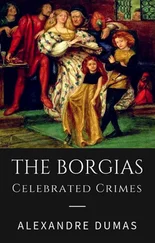Two days later Alexander VI tried a third time to persuade the college to agree to the creation of the new red hats; on this occasion fifteen cardinals arrived at the Vatican and did, finally, agree formally to the promotion of thirteen new colleagues. Guicciardini was to remark, some years later, that these cardinals were ‘selected not amongst the most worthy but amongst those who offered him [the pope] the highest price.’ Burchard listed their names and the fees that had been levied upon the value of their benefices, which amounted to the enormous sum of 160,000 ducats.
When the names were made public, it was clear to all that most had close links to Cesare and his father: Amanieu d’Albret was Cesare’s brother-in-law and his hat had been promised as part of the contract for his marriage to Charlotte; Pedro Luis Borgia was his cousin; Francisco Borgia and Jaime Serra, who had been tutor to his brother, the murdered Juan, were more distant relations; Juan Vera was Cesare’s own tutor; Pedro Isvalies was the governor of Rome; Ludovico Podocatharo was Alexander VI’s personal physician; Gianbattista Ferrari was datary to the pope; and so on.
Just six of the new cardinals were in Rome when the consistory agreed to their promotion, and they were summoned immediately to the Vatican to await the end of the meeting. ‘There, once the doors were open, they kissed the Pope’s foot, then his hand and his mouth,’ announced Burchard, and the cardinals ‘escorted them to the Duke of Valence’s rooms, which are above the Sala del Pappagallo.’ As the Venetian ambassador reported, ‘They went to the Duke, offering themselves to him, they dined with him, settled their accounts and swore their loyalty to him.’
It was with unusual haste, just four days later on October 2, that these six men attended a ceremony in St Peter’s during which the pope solemnly gave each one his cardinal’s hat, with its distinctive hanging tassels. Later that day Cesare left Rome to join his army marching north up the Via Flaminia toward the Romagna.
— CHAPTER 17 — Duke of the Romagna
‘FROM ALL PARTS COME REPORTS OF THE ILL INTENTIONS OF THE POPE AND THE DUKE’
CESARE RODE OUT OF ROME on October 2, 1500, with an entourage of young Roman nobles, papal bureaucrats to man the administration of his new state, and members of his household, including his secretary, his treasurer, and his doctor, the ever-present Gaspar Torella. After a brief detour to visit the grieving Lucrezia at Nepi, he joined his formidable army of over ten thousand men, who had now reached the foothills of the Apennines.
Marching under Cesare’s command were some of the finest condottieri captains available; or, as Machiavelli put it, ‘nearly all the professional soldiers in Italy.’ In addition to the Frenchman Yves d’Alègre and his three hundred lancers, and the Spaniard Miguel de Corella, Cesare’s ‘executioner,’ were Gianpaolo Baglioni, Lord of Perugia; Paolo Orsini, once a captain in Florence’s armies; and Vitellozzo Vitelli, the famous artillery expert whose family ruled the papal fief of Città di Castello.
Among the troops was the Florentine artist Pietro Torrigiano, famous for having broken the nose of his fellow student Michelangelo: ‘Money being offered in the service of Duke Valentino,’ as Giorgio Vasari recorded, he ‘changed himself in a moment from a sculptor to a soldier,’ though he was later to return to stone-cutting and travelled to England, where he created the tomb of King Henry VII in Westminster Abbey, which has been rightly described as England’s greatest memorial of the Italian Renaissance.
Cesare’s objective, before winter closed in and the fighting season ended, was to consolidate his control of the Via Emilia by taking Faenza, a strongly fortified city between Forlì and Imola, and to extend the state south to the Adriatic coast with Rimini and Pesaro, two towns south of Cesena. The going was slow on the long march north from Rome, the mud thick on the road; but Cesare was in no hurry to commit himself to expensive military action, hoping that the agents he had infiltrated into these towns would persuade the excommunicated vicars to surrender without a fight.
In Rimini the despised Pandolfo Malatesta, arrogant grandson of the famous condottiere Sigismondo Malatesta, made little trouble. He handed over the keys of his city to Cesare’s representative, the bishop of Isernia, before taking a boat to Venice, much to the relief of his subjects, who had failed in their attempt to remove him just two years previously. It proved almost as easy to convince Giovanni Sforza to leave Pesaro. On hearing that his erstwhile brother-in-law’s troops were crossing the Apennines and approaching the city, Giovanni, who had already been humiliated by the Borgias once before, fled and, just a few days after accepting the keys of Rimini, the bishop of Isernia did the same in Pesaro.
Cesare entered the city of Pesaro on October 27, his men-at-arms clad in his personal livery, which had been embroidered with a new emblem, the seven-headed Hydra, the mythical beast that when one head was cut off could grow another — an appropriate metaphor for Cesare’s military ambitions.
The conquest of Rimini and Pesaro achieved with so little trouble and expense, Cesare was in an accommodating mood, exercising the ingratiating charm that he could summon at will when required. He apologized to the Duke of Ferrara’s ambassador with ‘much amiability’ for not having seen him the day before when the envoy had called at his headquarters. But he had had so much to do; also he had been troubled by a painful ulcer in his groin.
‘The Duke’s daily life is as follows,’ the ambassador continued. ‘He goes to bed between three and five o’clock in the morning and consequently midday is his dawn.’ Despite his unusual hours, however, it was clear that Cesare worked hard and had earned the respect of his captains. ‘He is considered brave and strong and generous and sets great store by straightforward men; but he is hard in revenge as I have often been told,’ added the envoy. ‘He is thirsting for fame and seems more eager to seize states than to administer them.’
Having made a quick survey of Pesaro and instructing one of the artists in his entourage to make a painting of the citadel to send to his father in Rome, Cesare set out along the coast for the twenty-mile ride to Rimini, where he made his ceremonial entry on October 30.
Cesare now moved north along the Via Emilia toward Faenza, which, as he had informed the Ferrarese ambassador a few days earlier, he feared would not prove so straightforward as either Rimini or Pesaro; and he was right. Here, unlike so many of the other fiefs in the Romagna, the dynastic lords, the Manfredi, were well liked and respected by the people. A conspiracy to deliver the place over to Cesare was discovered and the plotters arrested: Cesare was forced to conclude that he faced a long siege.
After a heavy bombardment of the town, an assault was attempted but failed. A Ferrarese chronicler reported the news of this unprecedented defeat with ill-concealed jubilation. ‘On Saturday 28 November news arrived in Ferrara that the men of Duke Valentino, bastard son of the Pope, had come to Faenza with artillery and many Frenchmen in order to evict the Lord of Faenza but the men of that land killed many of the Duke’s men, and wounded many more, which was a marvel,’ particularly, as the chronicler explained, ‘because he had already acquired the lordships of Rimini, Pesaro, Cesena, Forlì and Imola by tricks and treachery and driven out those unfortunate rulers.’
Cesare’s hopes of a quick surrender had been met with brave defiance. Toward the end of November, with snow already lying heavy on the ground, his stores almost exhausted, and his irregularly paid mercenaries deserting one by one as the fighting season came to an end, Cesare decided to withdraw his men to Forlì, leaving a small force outside Faenza to continue the blockade of the town.
Читать дальше











